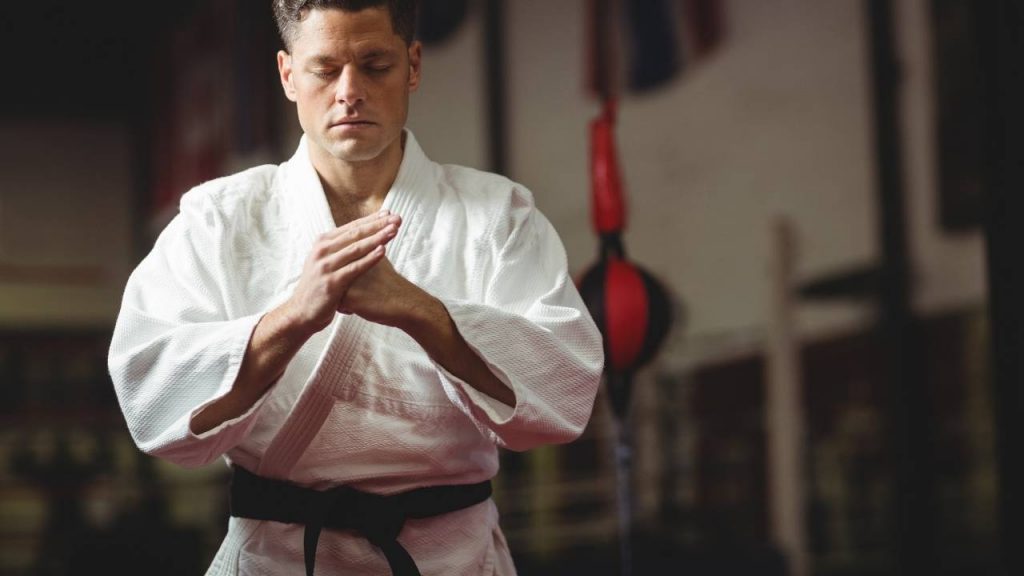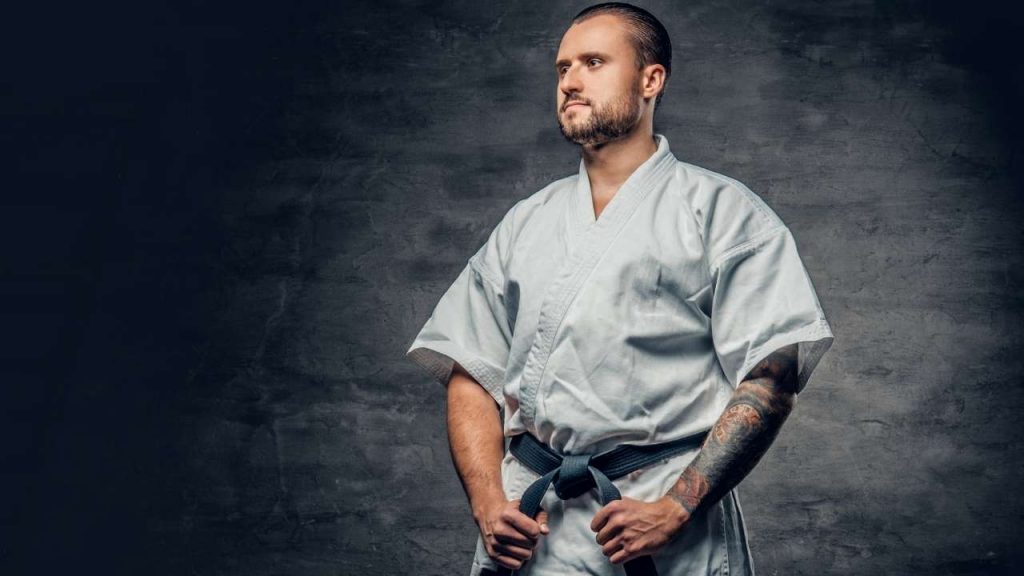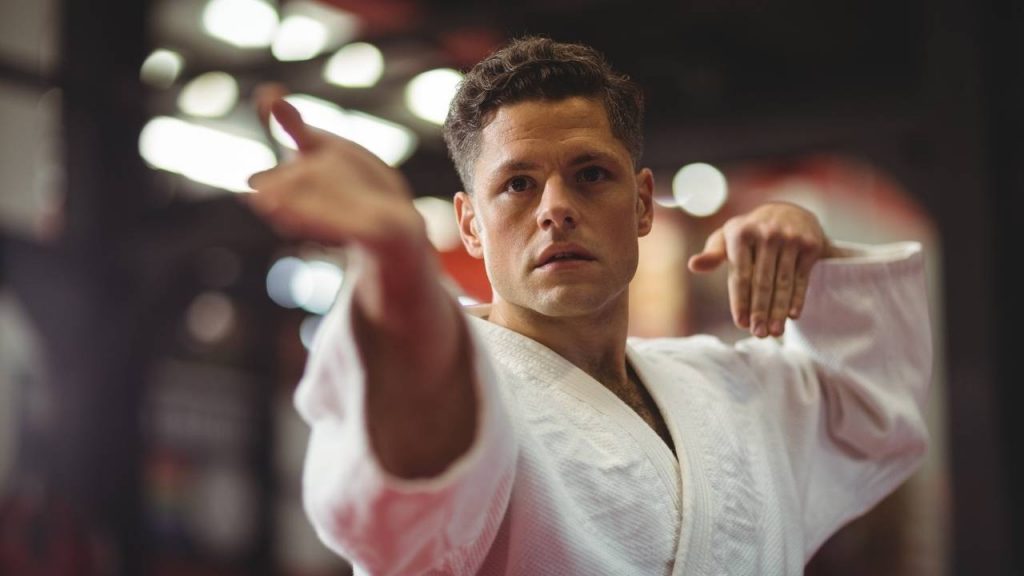A lot of us get inspired by martial arts through various means, and for various reasons. So, you show up to class, you work hard on your techniques – if you’re lucky you get a teacher who brings out the best in you. This is this the case for many of us. Have you ever wondered, what’s next?
A select few karate students push to achieve more than this – becoming a karate master. Paradoxically, this might not occur since learning takes forever in karate, like anything else. To become a master is something else entirely. So, let’s have a look at how to be a karate master.
Table of Contents
Who Is A Karate Master?
Positions of Grandmaster and Master are used to refer to people who have attained a seniority with a great deal of experience in martial arts. These titles tend to be honorary in nature, meaning that they don’t signify any rank, but rather identify a person who is distinguished and revered in their system or style of martial arts.
The Relevance
Those who love karate would agree with me when I say that this form (like all forms of martial arts) is not limited to its kicks, punches, or other fighting techniques. Karate teaches us a way to live; qualities of responsibility, self-control, etiquette, fair play, self- awareness, and focus and most importantly, the power of our mind.
Irrespective of whether you are a novice or expert in martial arts, karate has some great life lessons to take away for those who practice it. For one, how not to end up like Jim Carrey or Joy Behar.
Being a karate master isn’t only about packing a punch, it’s about deciding whether you want to or not.
To see yourself for who you are, and to be the best you can be. Sounds pretty simple, but it usually takes about a lifetime to achieve this.
Before speaking on how to be a karate master, let’s understand what distinguishes a good student from a great student. While most of us do achieve a proficiency in the art by spending a decent amount of time and energy on practicing it, the fact remains that it takes more to become a martial arts master.

What Is The Master Mindset Needed To Become A Karate Master?
Karate, like all martial arts is about living your potential, and the first step towards that is to develop the right mindset. There can be many students but only a few have the qualities needed to become a master. The good news is, anyone can develop that mindset. With a lot of courage and hard work, one can rise to the level of a master or grandmaster over time.
The 2 main things that distinguish a master from his contemporaries are:
- Focus
The question that a student of karate constantly needs to ask himself is, “What am I working on?”. The answer is more complicated than you think.
Each person’s goal is different, and we ask this question not in the general sense, to know about which kick or Kata the person is practicing. This question runs more deeply, and needs a person to think about how he intends to apply the learning he gets from karate into real life.
To be able to answer this question, one must be able to see techniques and moves beyond mere practice and execution. The more students reflect, the better they understand what they want from that particular move. After all, this is true to most life situations – it’s paramount to have a solution-focused mindset than a problem-focused one.
Awesome students are able to set specific goals for themselves and are more self-aware, making them better guides to themselves than anyone else.
- Growth
No matter how proficient you may feel you are in martial arts, you must remember that the room for improvement is infinite. There is always a move you can perfect, a move you can improve, or even a move you can create. Just look how the Fast and Furious and Michael Bay Transformers movies just keep innovating and getting better.
With many of us feeling bored of the ‘basic’ moves after a while, we become impatient to try out the ‘advanced’ stuff. Here’s some food for thought – advanced moves are just basic moves done better.
There is always something to explore or something to improve on, and it is this perfection that makes you stand out from a crowd. As a karate master everything about you, from your posture, to your technique, to your attitude, should reflect wisdom – and this wisdom comes with a lot of experience.
To have a growth mindset, one must be ever vigilant, be honest with oneself, pay painstaking attention to detail and constantly challenge themself.

How to Be A Karate Master?
Depending on where you are in your karate practice, becoming a karate master might take some time. But if you already have it in mind to become one or are interested but unsure of how to go about it, here are some things you need to know about becoming a martial arts master.
1. Mastering The Art
With the risk of stating the obvious, knowledge to teach comes from knowledge to be. This still is the most important part of becoming a master. The teacher plays the most important role so be sure to choose to learn under someone who has enough experience to motivate you and teach you advanced skills.
With many people claiming to be masters or teachers it is sometimes difficult to find the right teacher. So, make sure you take your time, and root around for reviews from other students before joining a particular teacher.
2. Work Through Ranks
Ranks are descriptive of a person’s level of experience, and comes in belts of specific colors. Karate practitioners are considered proficient once they’ve earned the black belt, which is called the 1st Dan. This requires one to be 15 years old and needs to have undergone 3 years of training.
Working through the ranks not only builds your credibility as a practitioner, it also helps understand the value and skills needed to successfully perform the technique.
3. Picking Your Karate Style
There are many major styles of karate, with slight nuances of movement that distinguish one style from another. These variations have originated in different cities; For example, Naha-te originated from Naha in Okinawa, Tomari-te is from Tomari in Okinawa and so on.
While there is no one best karate style, every practitioner tends to be inclined to one style. The best way to know which style of karate suits you best, try to cover all styles in your training.
4. Gaining Experience
Katas, or forms demonstrating karate moves, and Kumite or sparring matches are 2 key elements of karate exhibitions. Competing in these not only gives you a chance to see how you fare among others, it also helps you earn titles and a reputation (which is pivotal if you’re looking to have students of your own).
Attending seminars and joining industry associations help you with the resources you need to become a teacher.
5. Hands On Experience
It is hard to understand what it takes to be a teacher until you really are one, so look for simulating situations as close to teaching as possible. This could mean you assist a karate teacher or work under a master, so that you have real-life experiences from which you can learn.
6. Develop As A Teacher
Before being a teacher you will need to work on your skills as a teacher. Being a good teacher requires excellent communication skills across all age groups, a patience working with students, and a genuine love for teaching.
With a little luck and a lot of hard work, you will be able to gather students either by joining a club or Dojo, or by private tutoring as well.


